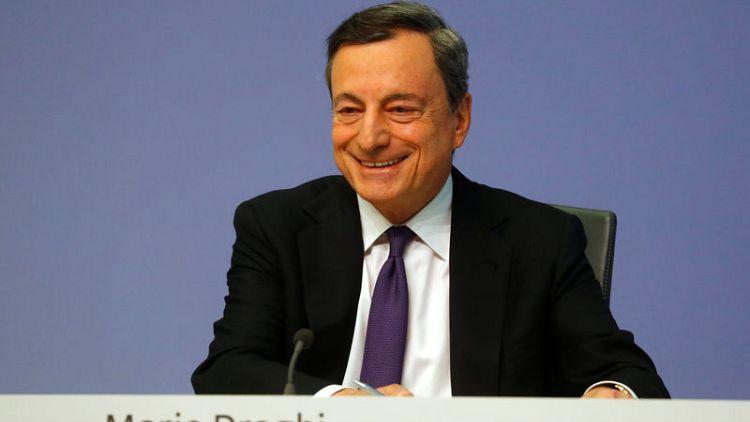By Balazs Koranyi
FRANKFURT (Reuters) - Euro zone growth could slow further and uncertainty is on the rise but the bloc's expansion remains solid and broad-based, European Central Bank policymakers concluded in April, the minutes of the meeting showed on Thursday.
With the ECB's 2.55 trillion euros (2.24 trillion) of quantitative easing bond buying set to expire in September, policymakers are debating whether to wind down purchases or keep the stimulus for longer given an unexpected slowdown in growth and rising political risk, particularly in Italy.
"Uncertainty surrounding the outlook had increased and caution was seen as warranted in interpreting recent developments, also because the moderation in growth appeared to be broad-based across countries and sectors," the ECB said in the minutes of its April 26 meeting.
"A more pronounced weakening of demand, notably related to external factors, could therefore not be ruled out."
Indicators from GDP to PMI data are all pointing to a major slowdown and the question is whether activity will level off at a lower rate or if more weakness is coming, after growth rose to unsustainable levels around the turn of the year.
For now, policymakers have played down concerns, arguing that growth is still robust and above the bloc's potential, so the ECB could still end asset purchases before the close of the year as inflation pressures will continue to build.
But policymakers privately argue that the slowdown could mean a first rate hike comes later than currently expected and the overall interest rate path would be more shallow as the ECB could hardly afford a major tightening in financial conditions.
They also worry that Italy's would-be government may loosen fiscal policy excessively and roll back a pension reform, setting off market turbulence that could undermine investor confidence.
Policymakers appeared to play down worries over growth, also taking comfort in strengthening wage pressures, which could eventually accelerate inflation.
"The underlying strength of the economic expansion remained broadly intact," the ECB said, adding that risks to growth remained balanced.
Markets have pushed back rate hike expectations from next April to June 2019 but analysts polled by Reuters still overwhelmingly expect the bond buys to end this year after a short taper.
While one-off factors contributed to the unexpected economic weakness, policymakers noted that capacity constraints were becoming evident in parts of the bloc, which could weigh on growth over the longer term.
Seemingly dropping their earlier concern about a strong euro, the minutes showed no major discussion about the currency, suggesting policymakers were comfortable with the euro's level.
In a potential relief for the bank, the euro has weakened over 5 percent against the dollar, a boost for export prices and inflation. Crude oil prices have also surged, with Brent <LCOc1> hitting $80 per barrel this week, pointing to higher prices in the coming months.
One policymaker at the meeting argued that inflation was close to a sustained adjustment towards the ECB's target, a precondition for ending asset buys, but the majority said there was insufficient evidence for such a conclusion.
The ECB has said it expects inflation to hover around 1.5 percent for the rest of the year -- still well below the ECB's target of just under 2 percent -- but some expect a spike in the coming months, due in part to higher oil prices.
(Reporting by Balazs Koranyi; Editing by Catherine Evans)



